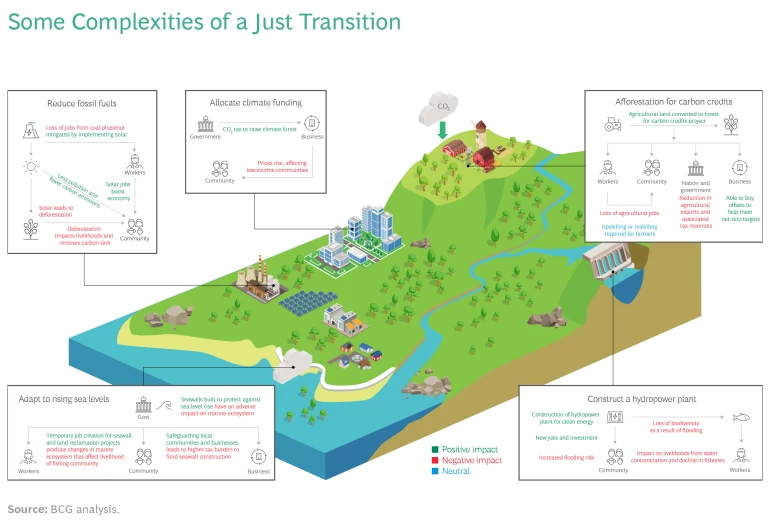The green revolution is taking off, but the transition must be managed thoughtfully to be as fair and inclusive as possible. We have a once-in-a-lifetime opportunity to get it right.
It is imperative, as climate action accelerates, to ensure a just and equitable climate transition. The potential benefits of climate action are crystal clear: protecting the planet, creating new jobs, and saving countless lives. But climate-friendly initiatives and policies, if not managed thoughtfully, can inadvertently have negative effects on economies, livelihoods, and the environment. A just transition ensures that climate action addresses both mitigation and adaptation in ways that are as fair and inclusive as possible, leaving no one behind.
Consider, for example, a few transition-related challenges and inequities: An unmanaged phaseout of the fossil fuel industry could eliminate 33% of jobs. Small and midsize businesses will have to spend $20 trillion to adapt their supply chains over the next 30 years. Without proper resource planning, 35 million acres of land could be deforested by 2050 to meet solar energy demand. Physical climate hazards—such as sea level rise, drought, heat stress, and intensifying storms—will continue to disproportionately impact the most vulnerable and disadvantaged populations.
Managing a just transition is complex and challenging, and we have a once-in-a-lifetime opportunity to get it right. Leaders can take the following four actions to successfully drive forward climate action while supporting a just transition.
Anticipate the Challenges
The risks associated with climate action will affect some communities much more than others, depending on where they are located, what type of work they do, and how quickly they can adapt. These risks must be anticipated in order to ensure that vulnerable groups are not unfairly disadvantaged by the climate transition.
- Manage the transition. The just transition will redistribute jobs across industries, disrupt job roles, affect tax revenue in local and regional economies, and exacerbate gender inequality.
- Protect at-risk groups. Governments and companies must increase investments to finance the climate transition, decarbonize operations, and address climate risks. The poorest 40% of the population are most likely to experience income losses as a result of climate change, and rising costs may further disadvantage these at-risk groups.
- Boost climate financing. To limit global warming to 1.5°C above preindustrial levels, the global community will need to spend $3.5 trillion every year over the next 30 years. Only 30% of annual climate funding has gone to emerging and developing markets (excluding China).
- Manage the impact on natural systems. The use of natural resources in the just transition, for example, will need to be managed particularly carefully. Well-meaning projects can have unintended consequences that affect human health, livelihoods, ecosystems, and biodiversity. Leaders will need to manage the transition within our planetary boundaries . (See the exhibit.)
Engage Companies, Investors, and Civil Society
Without question, the public sector must lead the just transition to a net-zero world. That said, companies, investors, and civil society also have a crucial role to play in greening the economy without leaving anyone behind.
- Governments and regulators must make sure that at-risk groups are not unfairly disadvantaged by the climate transition, develop policies that maintain economic competitiveness, and balance complex resource allocation decisions.
- Companies must ensure the welfare of employees affected by the climate transition (by reskilling or upskilling the workforce, for example) and work closely with suppliers to minimize disruptions as they decarbonize the supply chain.
- Investors should inject capital into sectors and regions that are aligned with a just transition, encourage companies to commit to a just transition, and incorporate just-transition principles into their investing strategies. They can also ensure the long-term sustainability and performance of portfolios by accounting for just-transition challenges.
- Civil society must promote an equitable transition, advocate for at-risk groups, and participate in social dialogues to help shape transition plans.
Address Existing Gaps and Barriers
The scale of a just transition is enormous, requiring a high level of coordination to realize the full benefits. Here are only a few of the gaps and barriers that must be overcome:
- It can be difficult to measure and ensure that the benefits of a just transition are being delivered. The public and private sectors must work together to improve the rigor and transparency of just-transition metrics, reporting, and monitoring.
- Siloed agencies focused on their own domains (such as energy, labor, and finance) are not well equipped to manage challenges holistically. Government agencies need to coordinate efforts more effectively to drive a just-transition agenda.
- Public-sector funding and support are still required to catalyze private-sector action. Together with major private-sector players, governments can provide cofinancing to develop emerging green technologies and projects.
- A clear regulatory framework can help overcome the private sector’s reluctance to act on a just transition. Comprehensive climate regulations and policies are needed to provide clear guidance.
- Non-energy sectors have an important role to play. Sectors that are hard to abate—such as cement, aluminum, and iron—require investments from both the private sector and the public sector (to support the use of green hydrogen or carbon capture and storage, for example).
Embrace Best Practices
Governments play a central role in the just-transition agenda and act as a catalyst for the private sector and investors. On the basis of our work on climate transitions with more than 15 countries and governments, and our experience as the exclusive consulting partner for COP26 and COP27, we recommend the following best practices for government leaders.
Embrace a consultative approach and encourage extensive engagement across stakeholder groups. In 2018, Germany’s federal government established a coal commission to end coal-fired power generation by 2038 and promote a just transition. The commission’s members represent a broad range of social, political, and economic stakeholders in the nation from the energy sector, mining, trade unions, environmental NGOs, the scientific community, civil society, and parliament.
Engage and collaborate with major trading partners and multilateral institutions early on to secure support and foster collaborative action. To support South Africa’s phaseout of coal, the Just Energy Transition Partnership was formed between South Africa and Germany, France, the UK, the US, and the European Union. The partnership is expected to prevent as much as 1.0 to 1.5 gigatons of emissions over the next 20 years and accelerate South Africa’s transition to clean power.
Take a “whole of government” approach to enable close coordination across government agencies as they advance the just-transition agenda. To improve the management of natural resources, the New Zealand government established a natural resources sector. The sector brings together many core agencies—including the ministry for environment, department of conservation, ministry of agriculture and forestry, and ministry of economic development—to establish a common direction for New Zealand’s natural-resources policy.
Allocate catalytic funding to support the development and scaling up of critical climate technologies that will rapidly accelerate the green revolution. In the US, the 2022 Inflation Reduction Act provides tax incentives for key climate technologies, including incentives to ramp up carbon capture facilities and boost green hydrogen production. The goal is to spur investments in early-stage companies that are developing and deploying the innovative technologies needed to meet net-zero goals.
If left unaddressed, climate change could push up to 132 million people into extreme poverty and generate a 2% loss in global GDP per capita by 2030. The just transition has the potential to create massive economic opportunities, including new jobs, GDP growth, and improved health and well-being. But it also brings certain risks. Governments, companies, investors, and civil society must work together, in a holistic way, to ensure that the green revolution maximizes social and equal opportunities for all, particularly the most vulnerable among us.
The authors would like to thank their colleagues Kelcie Abraham, Hugh Griffiths, Edmond Rhys Jones, Igor Lakic, Pei Shan Phung, Adrien Portafaix, Rebecca Russell, and Tyler Tung for their contributions to this article.














